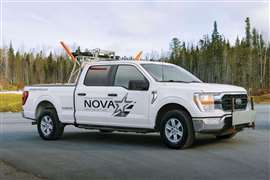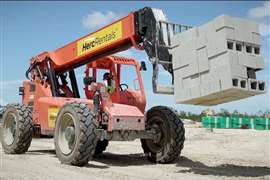Rental Management: Does it make sense to have specialist rental divisions?
17 July 2009

What is the best structure for a national rental business? Why should the economic climate, whether in growth or recession, impact the fundamental structure of a successful business model?
These questions are likely to be asked by every large rental company across the world, not just in the UK where the recession is widely forecast to hit hardest and longest.
The vast majority of the UK's large national renters have grown in part through the existence of specialist divisions, whether organically or by acquisition, and there is obvious logic to maintaining the individuality of an acquired specialist business.
Recently, however, the UK rental sector has seen Speedy Hire reorganising toward a customer/market led model rather than being product driven, and Hewden has collapsed its specialist divisions into a generalist structure.
At HSS Hire, meanwhile, the management team has broadly retained the tool hire structure it inherited from venture capitalist firm 3i in 2007, with specialist divisions comprising Training and the office-based One Call operation. When HSS was bought in 2004 by 3i, one of the first actions the new 3i management team took was to eliminate HSS's specialist divisional structure and in effect return it to the core HSS Hire Shops management structure, and install product managers to oversee the specialist product areas.
At first sight it would appear these are simple cost cutting measures - in the case of Speedy and Hewden as a response to the current recession, and for HSS under 3i to build the bottom line towards its eventual exit in 2007. However, each management team involved must have been convinced the results of these actions would be beneficial, or at least the lowest risk route to protecting net profit.
It is interesting to note in comparison the A-Plant strategy. On its website, A-Plant states it offers equipment through two business streams - ‘Plant & Tool Hire' and ‘Specialist Equipment'. So A-Plant has retained a single dedicated management umbrella for the whole of its specialist areas, which include accommodation units, powered access, traffic systems, generators, specialist pumps, welding equipment and rail equipment products.
In assessing the rights and wrongs of specialist divisions, consider first why the UK's national hirers, each of which originated with a single generalist plant and tool hire structure, found the best route to market for specialist product to be its own dedicated management and depot structure.
There is only so much product knowledge that even the best Hire Controllers, service and repair staff, and management can retain on a day to day basis. Each specialist product area, such as portable accommodation, toilets, lifting gear and height safety, and welding, requires a lot of expertise in dealing with specialist customers and applications.
A specialist division enables a company to focus on growing that area by allocating responsibility, channelling its investment in the most appropriate equipment, and attaining the best standards of product knowledge and customer service through the provision of the necessary staff training, and where required specialist delivery vehicles and support facilities.
There would have been additional incentives to opening specialist divisions. In the case of HSS the specialist divisions initially shared space in larger HSS branches or took over vacant premises that could not be sublet, utilised a common software system and finance function, and thus leveraged use of an existing cost base. The existence of supplementary management structures also offered additional scope for staff advancement and aided staff retention.
In due course, in any business, the volumes achieved in shared sites are likely to outgrow the premises, and new specialist openings can then be justified alongside core rental openings.
All well and good, whilst the business is growing and it's ROCE (return on capital employed) improving. However, at that point the fixed cost base (or breakeven point) starts to rise. As the specialist business grows so does its management structure, its vehicle fleet and its support structure, such as health and safety, debt collection and workshop facilities.
Perhaps larger customers, in construction or facilities management, now have multiple contact points in the business. The imposition of single contact points over the divisional structure can create friction or internal barriers in the overall business, due to increasing complexity.
So what is the alternative structure to specialist divisions?
A successful move to an integrated management chain is likely to necessitate:
• Retention of specialist product managers to handle the macro management of product investment, and key customer relationships.
• Relocation of specialist products to larger geographically strategic depots alongside the requisite vehicles and other facilities, and the disposal of sites that become vacant.
• Ensuring specialist product trained hire controllers, drivers and fitters are resident in those branches. This may well entail a number of redundancies and retraining where the location of relevant staff and branches become mismatched. Holiday and sickness cover can be maintained by floating staff.
• A well planned and closely controlled transition to the new arrangements so that it is seamless to the customer.
• Close and effective customer communication.
• Continued marketing emphasising specialist capability.
One factor that has facilitated such reintegration is the trend towards opening larger locations. When, for example, HSS opened its specialist divisions on 2000, it had relatively few superstores (the first being Slough back in 1995), and under its new management the acceleration in the opening of ‘premier centres' provides HSS with effective national coverage for specialist product rental within its core estate.
As HSS closed smaller, less efficient branches over the last 5 years, and successfully eliminated vacant leased premises, it has substantially improved its turnover to fixed cost ratio. To pull such savings through to the bottom line efficient stocking and delivery processes are a prerequisite.
In the current recession taking such steps are essential, but surely the minimisation of fixed costs should be a constant aim for any business at any time? Obviously that's why all the nationals have recently been closing branches and cutting staff. In the preceding decade we saw a chase for growth and market share, and perhaps that fundamental requirement was put on the back burner.
The general expansion of product range which fuelled the growth of specialist divisions has probably contributed to the trend towards larger locations, which has blurred the boundary between tool hire and small plant hire, for the ‘hire shop' operators in particular.
In practice we have seen specialist divisions develop in a time of growth and a return to generalist structures in the recession.
Is it therefore likely that in the near future, when the next generation of managers is in charge, and further consolidation and growth through acquisition is again well under way (as is almost inevitable), that someone has the bright idea of setting up dedicated divisions to manage specialist product? A continued move towards fewer and larger premises might argue against that.
It may be more likely that any revival of specialist divisions would come from another direction. If the largest nationals continue to consolidate in structural and depot terms, then any of the following may perceive an opportunity to fill a market gap through differentiation:
• The next tier down of renters, such as GAP Plant.
• The Builders Merchant rental operators such as Brandon Hire, who potentially have access to a myriad of sites.
• Newer entrants such as Supply UK Hire Shops.
• Successful independent specialists.
• Or even a large mainland Europe based rental business taking advantage of the recession to enter the UK market.
The key for all the national rental companies to eliminating specialist divisions and managing the business under a single management chain is how the customer interface is controlled. The importance of this is probably best demonstrated by reviewing the Speedy strategy given on its website, which lists eleven key aims. Number 1 reads: ‘Our strategy is growth driven by customer intimacy and operational flexibility.' Number 2 reads, ‘To retain a high degree of customer intimacy'.
Of the remaining nine aims, seven include the word ‘customer'. In the property market, the equivalent would be ‘location, location, location'. In the rental business it clearly should be customer, customer, customer!
As always in business there is no right or wrong way. There are a number of accepted models, until someone innovates and finds a new and better way.
Such innovations are likely to include increasing use of the internet and integration with customer's operating systems, making the rental company a virtual department of the customer, which will suit some customers but definitely not all.
In any event the recession has caused a shake down of the rental industry's strategic plans. Most are battling hard but having to stretch their existing resources.
This in the long run will affect efficiency and reliability. Maintaining a high standard of quality, safety and (increasingly) corporate responsibility will continue to be the key differential for the customer.
For specialist expertise and equipment the independents will perhaps steal the march. For those lucky enough to be cash rich instead of debt laden, opportunity is definitely there. For the big boys the necessity is to retain skills, and maximise the benefits of extensive stock availability and local presence nationally. The game is on to see who really can give the customer not just good intentions, but truly great service.
Whether specialist or not the paying customer has the advantage of plenty of suppliers to choose from, but the experience of renting from them is the real differential. Get it wrong and it will cost you very dear!
THE AUTHORS
The authors are Peter Thomas, with the assistance of Will Leftwich. Mr Thomas is a qualified accountant and an experienced rental executive who was finance director at HSS Hire from 1992 to 2004. Since 2004 he has worked with Chobham Consulting. Mr Leftwich, founder of Will Leftwich Associates (WLA), has 27 years experience in the rental industry, consulting on operational management, health and safety and business development in the UK, Europe and the US. Contact WLA at: Tel: +44 (0)121 242 5196, E-Mail: will@wlassociates.co.uk.






